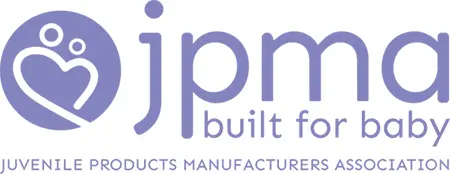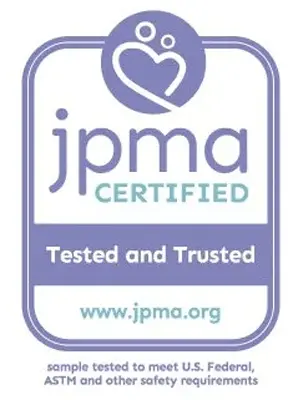
JPMA Certified stands for the Juvenile Products Manufacturers Association certification. It’s more than just a label; it’s a promise of quality and peace of mind for worried parents.
The certification process evaluates juvenile products to ensure they meet rigorous safety standards, providing parents with assurance about the safety of products for young children.
Key Points About JPMA Certification:
- Focuses specifically on juvenile products
- Ensures products meet rigorous safety standards
- Provides parents with confidence and reassurance in their purchases
The History of JPMA:
JPMA’s certification process has its roots in the association’s early efforts to promote child safety. Over the decades, JPMA has become a trusted name, built on thorough testing and compliance with high safety regulations. The organization constantly adapts to new safety concerns as they arise.
Why is JPMA Certification Important for Parents?
The JPMA certification is important for parents because it offers reassurance the product they are buying is safe for their child. This feeling of confidence is priceless, especially when navigating the overwhelming market of juvenile products.
Unlike many other safety certifications, JPMA is specifically focused on juvenile products and built upon years of expertise in child safety. While other certifications might only touch upon general safety, JPMA Certified products undergo an extensive review specific to the needs of children.
Key Benefits for Parents:
- Assures that products like strollers, cribs, and baby gates are safe
- Provides a reliable benchmark for safety-conscious parents
- Offers peace of mind in an otherwise overwhelming market
Understanding the JPMA Certification Process
Getting a handle on JPMA certification might seem overwhelming at first, but it doesn’t have to be. Understanding the steps involved can make it easier when choosing products for your little ones.
How the JPMA Certification Process Works?
The product certification process involves evaluating the product’s safety, construction, and overall reliability.
The process involves:
- Manufacturers submit their products to JPMA
- The product undergoes rigorous testing for safety, construction, and reliability
- If the product meets the required standards, it receives the JPMA Certified seal of approval
Commonly Certified Products:
- Car seats
- High chairs
- Cribs
- Baby monitors
- Bottles
What If a Product Isn’t JPMA Certified?
Not every product you encounter will have JPMA certification, and that doesn’t necessarily mean it’s unsafe. It tells you, the product hasn’t been through JPMA’s specific testing. In that case, weigh the pros and cons and think about how important safety standards are to you and your family.
How to Check for JPMA Certification?
Verifying if a product has JPMA certification is simple:

- Look for the JPMA seal right on the packaging. Most brands display it proudly, letting you know that their product has passed strict safety tests.
- If you’re unsure or can’t find the seal, you can always double-check by visiting the manufacturer’s website or searching through JPMA’s online directory.
Conclusion: The Impact of JPMA-Certified Products
JPMA-certified products significantly impact consumer trust and buying decisions. They reassure buyers, strengthen brand credibility, and serve as a benchmark for safety-conscious parents. When you see the JPMA-certified seal, you know there’s a backing of rigor and reliability, steering your choices with confidence.
